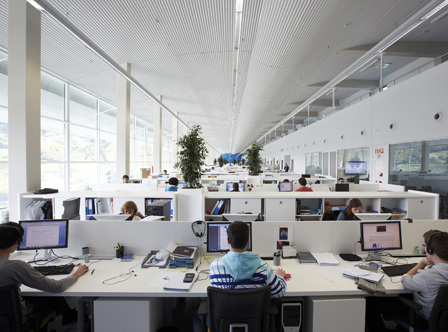NEWS


IK4-TEKNIKER has made available all of its expertise via a technological solution called “Automation and industrial robotics” from the point of view of the organisation's experience in terms of developments carried out internally and research actions focused on various technologies.
The project, jointly carried out by UPV/EHU, IK4-TEKNIKER and ULMA Handling Systems, was selected among 15 blueprints submitted during one of the challenges featured by the European project EUROC (European Robotics Challenges) and declared the winner. It was also rated as the best consortium of the ‘FLECOOP project: A flexible unitary picking system operating in collaborative environments for order processing at distribution centres that has served to set up a collaborative environment in the new Industry 4.0 context that is based on removing barriers in working environments.
UPV/EHU has been involved via the research group on robotics and standalone systems (RSAIT) at the IT Department under the leadership of professor Elena Lazkano.
IK4-TEKNIKER has built all of its know-how into its automation and industrial robotics solution based on the experience obtained in previous developments and research actions related to other related technologies such as viewing, mobile handling and safety.
As the consortium has been working on this project for some time, several stages have been covered in full. In fact, the prototype of the collaborative robot has already been physically developed. As an aside, it must be said that European Robotics Challenges consists of several phases.
In the first phase, 20 groups participated with the consortium formed by UPV/EHU, IK4-TEKNIKER and ULMA. In this initial stage, the robot had to perform several tests correctly to demonstrate its capabilities and full knowledge of the subject matter.
Fifteen groups qualified for stage two and the robot had to carry out a number of mandatory tests successfully requiring, for instance, that parts be placed accurately or bolts be screwed on properly. But only 5 teams made it this time, although the UPV/EHU, IK4-TEKNIKER and ULMA consortium was voted best project consortium. The challenge was based on delivering a solution to build safe workspaces with no physical barriers.
“Collaborative work between the different organisations that form part of the consortium, UPV/EHU, IK4-TEKNIKER and ULMA, has been very positive. All parties have provided the very best of their knowledge in this field. Consequently, the end result has been extremely satisfactory as it represents a big step with regard to developing the Industry 4.0 concept even further and implementing the "collaborative robot" project. Collaborative environments are becoming increasingly important all over the world because they can remove barriers in the working environment and projects like this, moreover, serve to underscore this new revolution at workplaces”, underscores Basilio Sierra, a professor at the IT Department of the UPV/EHU and a member of its research group on robotics and standalone systems.
Loreto Susperregi, the person in charge of robotics at IK4-TEKNIKER, also stresses the importance of collaborative robotics in industrial environments: “the degree of flexibility that this provides allows us to address applications characterised by variable production conditions which means that implementation can be done quicker and more easily. Due to the fact that this technology can adapt to all kinds of changes, it will become a crucial technology for the industry in the future”.



